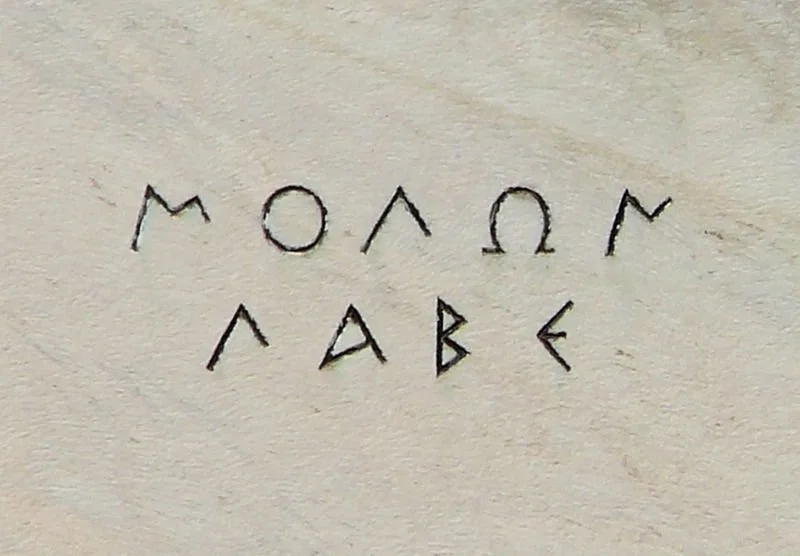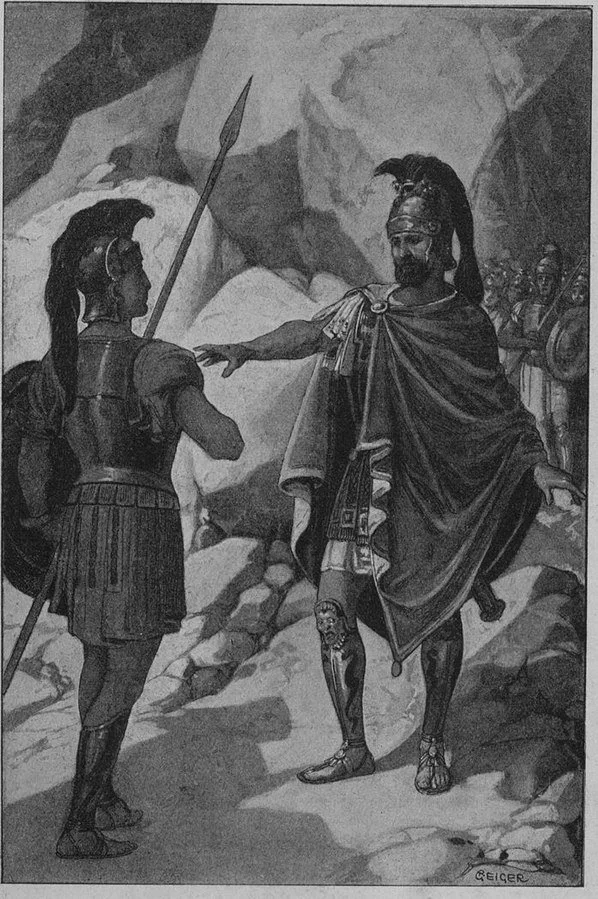Molon labe (Ancient Greek: μολὼν λαβέ), meaning 'come and take [them]', is a classical expression of defiance. It is among the Laconic phrases reported by Plutarch, attributed to King Leonidas I in reply to the demand by Xerxes I that the Spartans surrender their weapons. The exchange between Leonidas and Xerxes occurs in writing, on the eve of the Battle of Thermopylae (480 BC).
Grammar
The phrase "molṑn labé" Is in the Classical Greek of Plutarch, and does not necessarily reflect the Doric dialect that Leonidas would have used. The form "ἔμολον" is recorded in Doric as the aorist for εἷρπον, "to go, come". The classical pronunciation is [mo.lɔ᷆ːn la.bé], the modern pronunciation [moˈlon laˈve].
The phrase is participial, its literal translation would be approximately "having come, take!". This use of the participle is known as the circumstantial participle in the grammar of classical Greek, i.e. the participle gives a circumstance (the coming) attendant on the main verb (the taking). It is a form of hypotaxis, where English would use parataxis, the conjunction of two verbs, "come and take". This construction normally (but not always) occurs within narrative literature.
Geiger print of Leonidas sending a messenger to the Spartans
The first word, 'μολών' (molōn, "having come") is the aorist active participle (masculine, nominative, singular) of the Greek verb βλώσκω (blōskō, "to come").
The aorist stem is μολ- (the present stem in βλώ- being the regular reflex of μλώ-, from a verbal root reconstructed as *melə-, *mlō-, "to appear"). The aorist participle is used in cases where an action has been completed, also called the perfective aspect. This is a nuance indicating that the first action (the coming) must precede the second (the taking).
The second word, λαβέ, is the second person singular aorist imperative of λαμβάνω "take; grasp, seize". The entire phrase is thus in the singular, i.e. Leonidas is depicted as addressing Xerxes personally, not the Persian army as a group.
Origin
Plutarch cites the phrase in his Apophthegmata Laconica ("Sayings of Spartans"). The exchange between Leonidas and Xerxes occurs in writing, on the eve of the Battle of Thermopylae (480 BC):
πάλιν δὲ τοῦ Ξέρξου γράψαντος 'πέμψον τὰ ὅπλα,' ἀντέγραψε 'μολὼν λαβέ.'
When Xerxes wrote again, 'Hand over your arms,' he wrote in reply, 'Come and take them.' (trans. Frank Cole Babbitt, 1931)
The exchange is cited in a collection of sayings by Leonidas before the Battle of Thermopylae (51.2–15).
The main source for the events of the battle is Herodotus. According to his account, the Spartans held Thermopylae for three days, and although ultimately defeated, they inflicted serious damage on the Persian army. Most importantly, this delayed the Persians' progress to Athens, providing sufficient time for the city's evacuation to the island of Salamis. Though a tactical defeat, Thermopylae served as a strategic and moral victory, inspiring the Greek forces to defeat the Persians at the Battle of Salamis later the same year and the Battle of Plataea one year later.
Modern use
Greece
Modern use of 'ΜΟΛΩΝ ΛΑΒΕ' as a military motto appears to originate in the Kingdom of Greece during the First World War or the Greco-Turkish War. The motto is on the emblem of the I Army Corps of Greece and the Second Infantry Division of Cyprus. The phrase was inscribed on the Thermopylae monument (1955), using an archaic script that would be appropriate for the time of the Persian Wars.
During the Cyprus Emergency between Greek Cypriot insurgents and British troops, Cypriot leader Grigoris Afxentiou on 3 March 1957 became surrounded by British forces outside his secret hideout near the Machairas Monastery near Lazanias, Nicosia. The British troops requested him to surrender his arms, but Afxentiou shouted molon labe in reply. Unable to flush him out and sustaining several casualties, the British forces resorted to pouring gasoline into his hideout and lighting it.
United States
Allusion to the phrase in translation ("come and take it!") is recorded in the context of the Revolutionary War, noted in 1778 at Fort Morris in the Province of Georgia, and later in 1835 at the Battle of Gonzales during the Texas Revolution where it became a prevalent slogan.
In early January 1831, prior to the Texan Revolution, Green DeWitt wrote to Ramón Músquiz, the top political official of Bexar, and requested armament for defense of the colony of Gonzales. This request was granted by delivery of a small used cannon. The small bronze cannon was received by the colony and signed for on 10 March 1831, by James Tumlinson, Jr. The swivel cannon was mounted to a blockhouse in Gonzales and later was the object of Texan pride.
At the minor skirmish known as the Battle of Gonzales — the first battle of the revolution against Mexican rule – a small group of Texans successfully resisted the Mexican forces who had orders from Colonel Domingo de Ugartechea to seize their cannon. As a symbol of defiance, the Texans had fashioned a flag containing the phrase "come and take it" along with a black star and an image of the cannon that they had received four years earlier from Mexican officials. This was the same message that was sent to the Mexican government when they told the Texans to return the cannon; lack of compliance with the initial demands led to the failed attempt by the Mexican military to take the cannon back forcibly.
Replicas of the original flag can be seen in the Texas State Capitol, the Bob Bullock Texas State History Museum, the Sam Houston State University CJ Center, the University of Texas at El Paso Library, the Marine Military Academy headquarters building, Hoblitzelle Auditorium of the Hockaday School, and in Perkins Library at Duke University.
In the United States, the original Greek phrase and its English translation are often heard as a defense of the right to keep and bear arms and opposition to gun control legislation.
Use of the original Greek in the United States is more recent. Its use by militia organizations is reported for the 1990s or early 2000s. It is the motto of the Special Operations Command Central (SOCCENT).
Source: wikipedia.org










